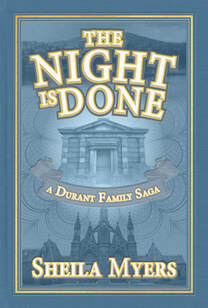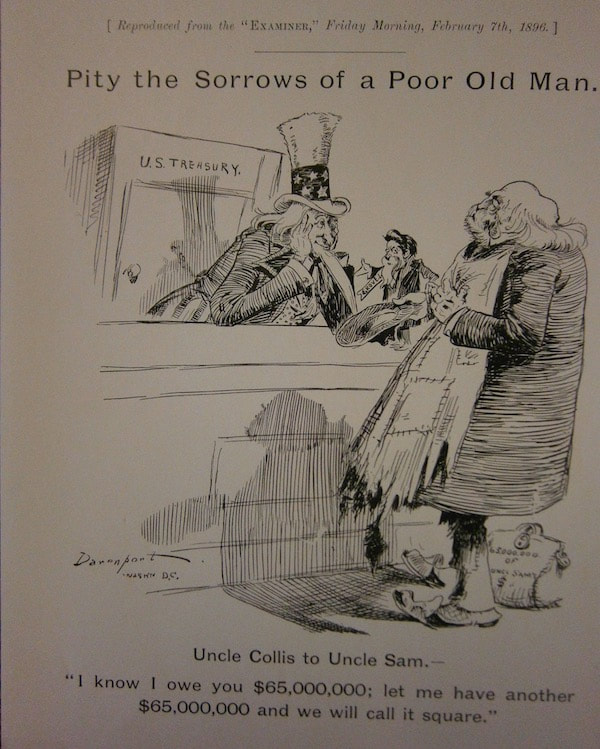 From Kirkus Review A historical novel, set largely in upstate New York’s Adirondack Park, about the troubled lives of real-life real estate investor William West Durant and his embittered sister, Ella. Myers (Castles in the Air, 2016, etc.) continues the story of the Durants in this third book in her Durant Family Saga trilogy. Thomas C. Durant was a railroad magnate who lost a fortune and died under a cloud—and intestate—in 1885. His son, William, assumed control of the family’s remaining assets and began new real estate and construction ventures in the Adirondacks. His sibling, Ella, who was somewhat of a bohemian, always felt financially shortchanged and ill-treated by her older brother—which caused litigation between the two. In the novel, told in the form of reminiscences of various characters, readers follow the arc of William’s career from his early days as a high roller (starting in 1892) to his impoverished life as an old man (circa 1931). In the end, not only has William lost all of his own wealth, but also money and land that Ella won in her final lawsuit—so they both end up losing. However, as William wrote to a friend in 1932, “I am poor, but I am happy, what more can most of us expect?” Myers writes with skill and has chosen well in deeply researching the Durant saga, which remarkably parallels Greek tragedy. It’s a truly engrossing story, and Myers does it justice. William is effectively portrayed as being more clueless than anything else, as he honestly doesn’t understand that he is treating his sister—and his wife, for that matter—very badly. He’s also obsessed with his camps in the Adirondacks, giving readers the impression that he sees the whole park as his personal fiefdom. That’s likely the reason why Myers uses the very clever gambit of telling the story from the perspective of William in his old age, when he’s “calm of mind, all passion spent,” and being interviewed by wealthy Harold Hochschild, who now owns William’s old camp, Eagle’s Nest. To compare William to the aged Oedipus is not so great a stretch. A well-wrought, classically inspired riches-to-rags tale.
0 Comments
 Myers (Imaginary Brightness) satisfyingly concludes her historical trilogy set in the Gilded Age by presenting the detailed downfall of ruthless real estate mogul William West Durant; his exasperated wife, Janet; and his estranged sister, Ella. In 1931, the penniless Durant recounts his tragic life. After inheriting his father’s vast wealth and interest in the Adirondack Railroad, William immediately begins to make bad investments. He squanders money on yachts, panders to princes, and builds mansions he can’t afford to run, all while hiding assets from Ella. She sues him for her rightful inheritance and tries to overcome discrimination to become a novelist. Meanwhile, Janet, verbally abused and infantilized by William, begins an affair with her doctor. After getting proof of William’s own infidelities with an actress, Janet sues for divorce.....Myers expertly depicts a precarious era soaked in vicious gossip, stained reputations, and ostentatiousness. Readers will enjoy the historical details that bring this Gilded Age soap opera to life. (BookLife) May 10th, 2019 marked the 150th anniversary of the meeting of the Central Pacific and Union Pacific railroad lines in what was called the Transcontinental Railroad. This scene from the t.v. show Hell on Wheels recaps the end of the venture. Doc Durant delivers a compelling argument that the railroad could not have been built without the iron will and deceit of men like himself.
Are "truths delivered by lies no less true"? And are "dreams made reality by falsehoods no less real"? In this scene Doc Durant chastises the men in Congress who are now investigating him for his unsavory business tactics. He had a right to be indignant since the men investigating him were well aware he used bribery to get bills passed that favored and subsidized the building of the Transcontinental Railroad, lining the pockets of men like Durant and Collis P. Huntington of the Central Pacific Line. I was writing the Durant Family Saga when someone told me about Hell on Wheels. Colm Meaney does a great job reanacting Doc's blustery personality (although he looks nothing like the real Doc Durant). My saga begins where Hell on Wheels ends. The Durant Family Saga is a reunion of Doc Durant's family in the United States, after he had sent them to live abroad while he built the transcontinental. During the 1860s Durant had acquired over 1/2 million acres of wilderness in the Adirondacks and expected his son, William West, to help him develop a new transportation line that would cut through the forests and reach Canada. Along the way Doc expected he would make another fortune selling off and developing land for vacation homes and resorts. What Doc hadn't planned on was the financial panic of 1873 or the public, his business partners and stock owners turning against him. By the time his family appears on the scene in 1874, leaving behind their friends and family in England, Doc is financially bankrupt and his reputation in tatters. He had to contend with numerous lawsuits against him, a family that was not used to taking orders, and a son who had spent most of his life spending money rather than investing it. Beyond the business dealings, the Durant family life offered enough drama for me to write a trilogy. But the legacy of the Transcontinental never ends. Congress instructed special committees to investigate the business dealings of the two railroad empires and Durant and Huntington were hounded by the press. Durant died in 1885, never having to own up to his wrong-doings. Huntington's company however was fined by the government and he spent his last years constantly defending his reputation. He got his revenge though. Because soon after Doc Durant dies, Huntington takes Durant's son, William under his wing. This relationship proves unfortunate for the Durant family fortune. Huntington calculated revenge against his old rival and William was too naive to see this. William's hope to fulfill his father's ambition to develop the wilderness was financed with money borrowed from Huntington. In the end, Doc Durant was right, his dreams, made reality, were based on falsehoods. 1/8/2019 Preserving Public History This is an ode to those public historians who went out of their way to write and publish local history that would otherwise have been forgotten. Whether it was about their own past experience, or the history of a place, these books are gems for those of us writing historical fiction. They are accounts of the ordinary people, ones who may not have been famous, but whose lives are the fabric of the past. I've found my share of these treasures while researching my novels. 7/23/2018 The Mountains I've Climbed While Writing Why am I doing this? As a writer, this question pops into my head all of the time, especially when I am doubting whether all the effort I've put into my work with play out. You know, like I'll win an award, sell enough books to pay my mortgage one month, grab the attention of a literary agent or better yet, a publisher. It can be a lonely existence inside my head; these thoughts swirling with no place to land. I was reminded of this just recently while waiting for a response to a query I sent out to some agents. What if they have no interest in my work? The rejections and doubt can get rather depressing. And then I was reminded of a quote from a book that I've read more than once: Zen and the Art of Motorcycle Maintenance by Robert Pirsig. “Mountains should be climbed with as little effort as possible and without desire. The reality of your own nature should determine the speed. If you become restless, speed up. If you become winded, slow down. You climb the mountain in an equilibrium between restlessness and exhaustion. Then, when you’re no longer thinking ahead, each footstep isn’t just a means to an end but a unique event in itself. This leaf has jagged edges. This rock looks loose. From this place the snow is less visible, even though closer. These are things you should notice anyway. To live only for some future goal is shallow. It’s the sides of the mountain which sustain life, not the top. Here’s where things grow." 6/4/2018 Literary Award for The Night is Done There's been an ongoing joke in my house that I've spent too much time submitting my work: short stories, essays, and novels, to contests that I never seem to win. It's like the lottery or something, the chances I'll win are a long shot in today's competitive publishing world. In addition, some contests charge reading fees, hence I've also spent a considerable amount of money on these contests. Well, it finally paid off for me when my novel The Night is Done won the Adirondack Center for Writing's Literary Award for Best Book of Fiction 2017. After some car trouble and a late start from my home in Upstate, NY and a five hour drive to Lake Placid, I got to the award ceremony just as they were announcing the winner. |
AuthorSheila Myers is an award winning author and Professor at a small college in Upstate NY. She enjoys writing, swimming in lakes, and walking in nature. Not always in that order. Archives
April 2024
CategoriesAll Adirondacks Algonquin Appalachia Award Cades Cove Canada Chestnut Trees Christmas Civilian Conservation Corps Collis P. Huntington Creativity Doc Durant Durant Family Saga Emma Bell Miles Finger Lakes Great Depression Hell On Wheels Historical Fiction History Horace Kephart Imagination National Parks Nature Publishing Review Screenplay Short Story Smoky Mountains Snow Storm Stone Canoe Literary Magazine Thomas Durant Timber Wilderness World War II Writing |
|
|
All materials Copyright 2022
Any reproduction, reprint or publication without written consent of author prohibited. |

 RSS Feed
RSS Feed